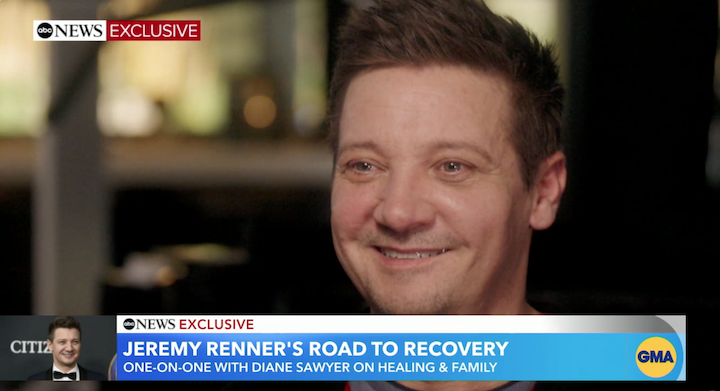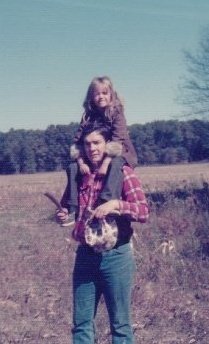From GMA News Exclusive. Watch the full video here.
When I was 18, my dad died by suicide. I don’t think there is anything worse than seeing someone struggle and being unable to save them. Watching my dad suffer so deeply, so profoundly, to the point where he took his life is a pain beyond anything I’ve ever experienced. And so I, in my early 20’s, then decided to end my life, as I didn’t think I could endure that pain any longer.
Kathryn and her father.
Clearly, I wasn’t successful. And about 10 years later, after that attempt, I decided to really save my life from suicide but to do that, I had to understand what caused it in the first place. So I spent the next 20 years learning about the single consistent predictor of suicide: hopelessness. And then, I learned how to prevent it through Hope. I created the first-ever, free, global, evidence-based program that teaches Hope around the world called Hopeful Minds.
If you have not seen the Diane Sawyer story on Jeremy Renner, watch it. It’s so powerful. So profound. So touching. And really gets to the root of what I know to be true and have been teaching kids for so many years. And that is, to overcome any challenge in life, you need Hope.
I believe Hope is the most powerful tool we can give to people. Hope predicts how quickly we recover from injury. How we face adversity. How we overcome obstacles. How we reach goals, and our ability to rework goals if necessary. Hopeful people are able to think about steps they need to take to reach goals. Working towards goals can feel challenging, but Hopeful people are equipped with the tools to overcome unpleasant emotions and work past goal-reaching obstacles with creative problem-solving.
Jeremy Renner, known as the Avenger Hawkeye, has literally used every single element we teach to SHINE Hope:
- Stress Skills: These are skills we use to manage our stress response; anger, sadness, and fear. You can see in the Diane Sawyer interview the amount of pain he is in due to his recent accident, and he does the single most important thing; he breathes. It doesn’t matter if you are in physical or emotional pain; the number one skill you can utilize to get through it is breathing. And pain does not last forever.
- Happiness Habits: Jeremy is using Happiness Habits throughout his recovery. He is laughing (even through the hard times), he is eating well, and he is exercising (what little he can). Every single day, he is showcasing how to practice Happiness Habits even in the hardest circumstances.
- Inspired Actions: Jeremy is taking small, practical steps toward his goal. He is already stating he may or may not act following his recovery, one day at a time. He is setting SMART goals every day to get better. He is staying present and not acting from his stress response, yet waiting until he gets better.
- Nourishing Networks: Jeremy is surrounding himself with friends and family. People are reaching out to him to check on him. He is working with a physical therapist daily, writing down his plans, and taking steps toward healing. He is working hard to take steps every day to get better, and using those around him as support.
- Eliminating Challenges; Jeremy knows the impact of rumination, or going over and over the accident in his mind, so he is working to stay present. He is not internalizing his failure, but rather he is moving on to what is next. He is staying out of worry about the future of acting and his health and working to stay present and in the moment of what is next.
Jeremy talks to Diane Sawyer about all of this in the interview, and it is so clear he is practicing the skills necessary to have a Hopeful mindset. Jeremy could easily give up, retire, and be relaxed about his recovery. Yet he is not, and he is focused on what is under his control and what he can influence for his future.
I believe Jeremy is demonstrating high Hope. I wasn’t always high in Hope, yet I learned the skills to become Hopeful. And today I am.
No matter how bad or sad I feel, I address my emotions and move back toward what I can do about it; I take actionable steps. As I walk in nature, run on the treadmill, call a friend, or pet my dog, I am taking the initiative to maintain my own Hopeful mindset.
If we want to prevent suicide, we must understand what causes it: Hopelessness. And hopelessness is learned. So if we want to prevent suicide, we must start teaching ourselves, our kids, our colleagues, our friends – everyone – how to Hope.
Jeremy and the handling of his accident and hopelessness is a great model for us all. As he could have easily given up. Yet he didn’t. And that is because of his ability to Hope.
Now the question remains, how Hopeful are you? Measure your Hope today. And start practicing skills to create, maintain, and grow your Hopeful Mindset.





Speak Your Mind